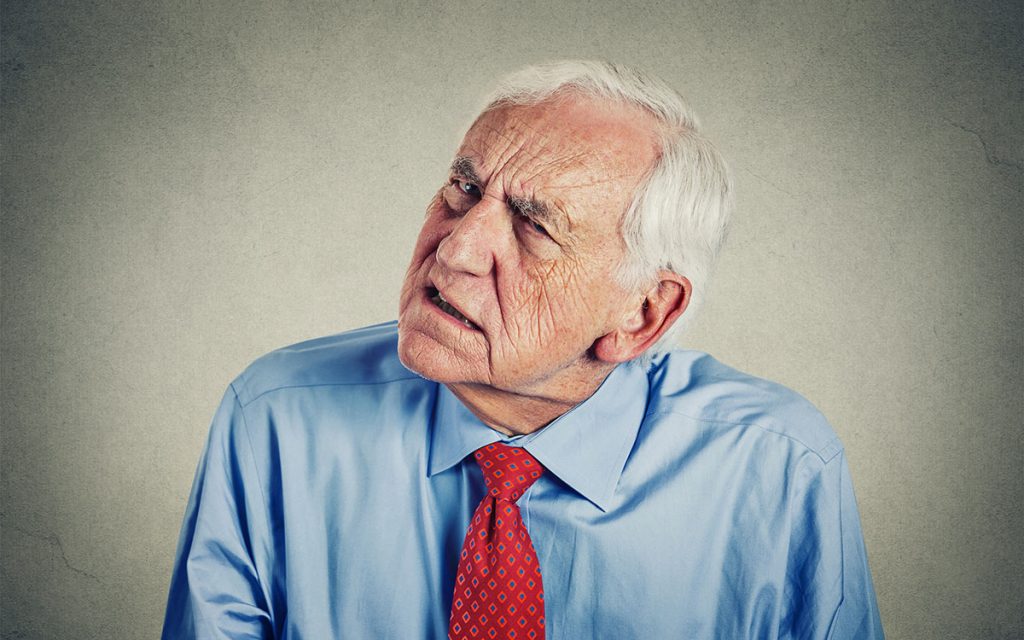Does your hearing go out sometimes, and then come back? There are several things that can cause this.
It’s been a long day, so you kick off your shoes, plop down on your couch, and turn on your TV–and you’re immediately alarmed. The TV is so loud that you have to scramble for the remote before your neighbors come stomping over.
You were the only one watching TV recently (binging on the news–you have no regrets), so why in the world was the volume so high? Were you deaf yesterday and not today? Can hearing loss come and go like that?
Well, sort of…It depends on the hearing loss.
Hearing loss that stays
There are a few forms of hearing loss that come and go–and there are some types of hearing loss that stay with you. When hearing loss is sensorineural (a really fancy and difficult-to-spell word that basically means there’s damage to your auditory nerve or inner ear), it’s permanent. There’s nothing known to modern science (or, I suppose, modern science’s knowledge of ancient science) that can make those hairs grow back for humans…yet.
This permanent hearing loss is of the type that can be caused by noise damage or cumulative damage to the ears over time (or a combination of both, which is usually what happens). If sensorineural hearing loss were at work, you’d never notice that your TV volume was turned way up (usually, someone else would have to notice that for you).
What causes hearing loss to come and go
On the other hand, there are indeed some forms of hearing loss that are a little more intermittent and may come and go. This kind of hearing loss can be caused by several things.
Eustachian tube issues
You know how when you’re on an airplane and you have to “pop” your ears? That’s actually your eustachian tube at work. It’s a tiny canal that connects your nose to your ears and is generally responsible for keeping pressure equalized throughout all the air sacs in your noggin. Allergies can make these issues worse. When you have a sinus infection or when other things go awry with your Eustachian tubes, pressure can build up on one side, and this can actually impact your ability to hear.
Loud noises
This should not come as a shock, but loud noises are not good for your hearing. In fact, when your ears are exposed to really loud noises, such as rock music concerts (or whatever you kids listen to these days) or gunshots or nearby thunderclaps, you may temporarily lose some of your hearing. Your hearing will often return, but this is usually a big bright sign that your ears have undergone a trauma of some kind.
Obstruction
Any obstruction in your ear, biological or otherwise, is likely going to cause some form of temporary hearing loss. One of the most common obstructions is earwax. This hearing loss will last until the obstruction is removed. Easy-peasy-lemon-squeezy.
Meniere’s Disease
While it’s not particularly well understood, Meniere’s Disease is an affliction that primarily affects the ears. Meniere’s can cause intermittent hearing loss, although over time this temporary loss can become permanent. Additionally, Meniere’s can play havoc with your inner ear, creating balance and stabilization issues. Early treatment can help you get a better handle on Meniere’s Disease, so if your hearing is coming and going, it’s worth getting checked out.
Treating hearing that goes out sometimes
Whether your hearing loss is the come-and-go kind or the move-right-in-and-never-leave kind, it’s important that you seek out treatment. Many come-and-go hearing loss types will resolve on their own, but many also won’t, and it’s hard to know which is which without consulting a specialist.
So, when you notice that the volume on your radio or your TV is high, you should probably make an appointment with a hearing specialist for a quick hearing exam.
As with all types of hearing loss, the sooner you can identify the problem, the more options you’ll have.
